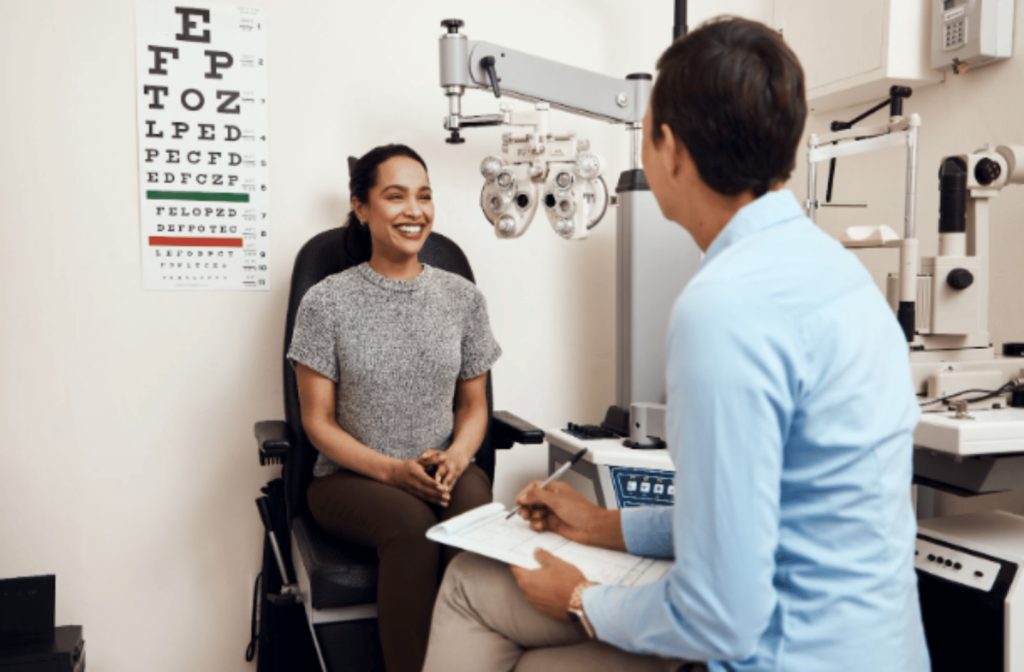Eye exams might not cross your mind as often as a physical checkup with your healthcare provider, but is just as crucial for your eye and overall health. Regular eye exams help assess vision clarity and form part of preventative care by detecting eye problems early.
Adults and seniors should have an eye exam every year, children once between the ages of 3 and 5, and annually once they start school. Based on your eye health and vision needs, your eye doctor may recommend more frequent exams.
Understanding the Eye
The human eye is your window to the world. It interprets shapes, colors, movements, and more, translating them into images your brain can understand. Despite its small size, the eye is complex and can develop various vision problems.
Eye conditions and eye diseases that develop in childhood and adulthood can significantly impact learning and daily life. Vision symptoms, such as blurry vision, sensitivity to light, and redness, are not normal and make regular eye exams vital for early detection, diagnosis, management, and treatment of underlying causes.
Importance of Early Detection
Early detection through regular eye exams assists your eye doctor in preventing and treating eye diseases that could lead to vision loss. Many eye diseases have no noticeable symptoms in their early stages or they develop gradually, but if caught early, can lead to effective management.
Signs You Might Need an Eye Exam
Certain vision symptoms may signal it’s time to schedule an appointment. Eye exams can also detect various eye-related and systemic health problems. If you experience blurred vision, frequent headaches, difficulty seeing at night, eye strain, dry eyes, or physical changes to the eye, don’t delay seeing your eye doctor. These signs could indicate underlying issues needing immediate attention before they worsen and affect your vision.
Other times you may need an eye exam before your next scheduled appointment can include:
- Your current prescription of glasses or contact lenses no longer provides vision clarity.
- You want to switch from glasses to contact lenses. A contact lens prescription is different from an eyeglasses prescription. A contact lens exam is needed to get a contact lens prescription.
- Your doctor put you on a new medication that can have ocular side effects. More frequent eye exams can help monitor your eye health.
- If you’re recently diagnosed with a condition that can affect the eyes.
What Happens During an Eye Exam?
During an eye exam, your eye doctor will discuss your eye and medical history, medications you take, family history, and lifestyle. Make the most of your appointment by coming prepared with questions or concerns about your eye health.
After your discussion, they may conduct all or some of the following tests tailored to your needs:
- Visual acuity test
- Depth perception
- Color vision test
- Pupil response test
- Peripheral or side vision
- Eye muscle movement
- Eye focusing
- Eye teaming
- Measure the cornea’s curvature
- Refraction tests
A comprehensive examination also includes looking at the eye’s structures, including the cornea, lens, retina, and optic nerve at the back of the eye, to give more insight into your overall eye health. Based on your results, they will recommend any necessary treatments or corrective eyeglasses or contact lenses.
Frequency of Eye Exams
If you’re unsure when to visit your eye doctor for an eye exam, follow the recommended guidelines provided by The American Optometric Association. However, the frequency of eye exams can change depending on various factors, including age, health history, and risk factors for eye diseases.
Children’s Eye Exams
Early children’s eye exams are important and include a baseline exam between 6 and 12 months of age. Children should have their next comprehensive eye exam between 3 and 5 years. Annual eye exams are recommended for children before they start grade 1 and continue until adulthood or grade 12.
Adult Eye Exams
Adults between 18 and 64 years should have an exam once every year. However, if you have a health condition that affects your eyes, such as diabetes, your eye doctor may recommend more frequent exams.
Senior Eye Exams
Seniors 65 and over should have annual eye exams to check for and monitor age-related changes, such as cataracts, macular degeneration, and glaucoma.
Proactive Approach to Eye Health in Fort Worth
It’s vital to have regular eye exams to maintain eye health and vision. Maintaining vision clarity and detecting vision problems early, can significantly improve your quality of life and preserve your eyesight for longer. Don’t put off regular eye exams because you don’t present with any symptoms or vision discomfort. Certain eye problems only get detected through an eye exam. Take a proactive approach and book an appointment with Pack Optical today.



